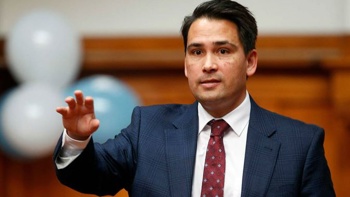UPDATED 5.22pm Uber is defending its approach to vetting drivers after the Government threatened to ban the company from New Zealand.
LISTEN ABOVE: ACT leader David Seymour spoke to Rachel Smalley
The company insisted today that passenger safety remained a top priority, following critical comments by Transport Minister Simon Bridges about its screening process.
In one of his strongest statements on the issue, Bridges said that a total ban on Uber was one of Government's options if the taxi service failed to comply with safety laws.
Uber changed its vetting process in April to no longer require drivers to hold a passenger or "P" endorsement, which meant some drivers were now flouting New Zealand law.
An Uber spokesman described its vetting system as cheaper and more affordable than the official regime.
"Our safe, fast and affordable screening process enables more Kiwis to access economic opportunities provided by ridesharing, while delivering the safety outcomes the travelling public want and expect," he said.
The company said New Zealand's licensing requirements cost local drivers more than $2000 and took up to three months to complete. Its own vetting system cost just $20 and took 6 days.
Uber now wanted to work with the New Zealand Government to develop a different regulatory framework.
"We would be willing to meet with the Government to discuss a path forward that puts consumer safety first and makes it possible for everyday Kiwis to share rides in their spare time," the spokesman said.
Earlier today, Transport Minister Simon Bridges said a ban on Uber was not the Government's preferred option, but passenger safety was paramount.
The company was mocking the law by not properly checking its drivers' criminal and medical histories, he said.
"Clearly it's an important matter. We want the law enforced and not mocked, as it frankly is being by some at the moment."
The P endorsement includes a police check, a fit-and-proper person inspection and regular checks that the driver is able to provide a transport service.
Uber carries out a lighter check, based on Ministry of Justice criminal records and New Zealand Transport Agency (NZTA) driver licence records.
Bridges said "dozens and dozens and dozens" of Uber drivers were now being dealt with by the NZTA.
The agency was also looking more broadly at the way Uber operates in New Zealand. One of the potential responses was making the company illegal, Bridges said.
"As I've said, they are looking at that."
Bridges said it was important that New Zealand did not kill off innovation.
"But safety is paramount. And we cannot have a system where drivers on our roads don't have the medical checks and we don't have an assurance that they haven't got charges pending and may have behaviours that would mean you or I would not want to get into those cars.
"We don't have the assurance there, and so I want to see everyone, whether it's Uber, whether it's Co-op [or] other taxi drivers, operating on the level playing field."
Labour leader Andrew Little said it was important that Uber followed New Zealand's licensing requirements.
However, threatening the company with a ban seemed "a bit over the top", he said.
Act Party leader David Seymour said banning Uber would send the "completely wrong message" about New Zealand's attitude towards technological change.
New Zealand should instead go the other way and simplify its licensing rules, which he said were complicated and costly - up to $2000 per driver.
Eight Uber drivers have been taken off the road since the new rules were introduced.
Bridges said he was satisfied with the rate that the safety laws were being enforced.
Authorities could not just "click their fingers and everything happens", he said.
Drivers who do not comply with the rules are first given a warning, before any potential prosecution takes place. They can face fines of up to $10,000.
Asked whether he would take an Uber himself, Bridges said the service did not exist in Tauranga, where he lives.
He later said: "My advice to [New Zealanders] would be to think very closely before you drive an Uber, certainly don't be doing it if [they] haven't got a P endorsement."
Take your Radio, Podcasts and Music with you









